
Superabundance: Separating Fact From Myth About Human Flourishing on an Infinitely Bountiful Planet
Contrary to conventional wisdom, we are not living in an age of dwindling resources. Generations of people have been taught that the world's rapidly growing population is consuming the planet's natural resources at an alarming rate. But after analyzing the prices of hundreds of commodities and products over the last 100 years, Marian Tupy and Gale Pooley found that resources became more abundant as the population grew.
To their surprise, they found that we create ever more value out of natural resources, and that now is a time of superabundance and human flourishing. Don’t miss this compelling rationale for optimism.

Chip War: the Fight for the World's Most Vital Technology and the Staggering Vulnerability of the U.S.
The world as we know it relies on computer chips, and the most important ones are made largely in Taiwan. This renders the U.S. shockingly vulnerable as China continues saber rattling in the region. Don’t miss this enlightening talk with economic historian and author Chris Miller.

How Worried Should We Be About Dysfunctional Government? A Gifted Constitutional Expert Weighs In
Congressional gridlock has created a vacuum that undermines key principles of the Constitution, raising concerns about the country’s future. Yet constitutional expert extraordinaire Kannon Shanmugam believes our future is bright. Learn why.

Why the Lies We Tell in Public Are So Destructive with Duke's Timur Kuran
Hiding what we really think can have devastating social consequences, and helps explain the rise of Donald Trump, why Harvey Weinstein got away with it for so long, the unreliability of election polls, and much more. Don’t miss this eye-opening conversation with Duke’s Timur Kuran.

Complicit: When Good People Turn a Blind Eye to Rape, Thievery, and Fraud. With Harvard’s Max Bazerman
Countless people knew what Harvey Weinstein, Elizabeth Holmes, and the Catholic Church were doing – but remained silent. Why do good people allow the horrific behavior of others? Harvard professor Max Bazerman explores this complicity and offers solutions.

A Mind-Blowing Look at How Our Brains Create Our Reality. With Renowned Neuroscientist Lisa Feldman Barrett
Our brains run the show and determine how we relate to the world. Discoveries from the front lines of neuroscience show our brains are creators (as opposed to spectators) of reality and also creator of our emotions. Don’t miss this enlightening talk with Lisa Feldman Barrett, one of the world’s most cited scientists for her groundbreaking research in psychology and neuroscience.

What Does the Work of The Future Look Like? With MIT Professor David Autor
Why will tech and automation never lead to the demise of human work? What qualifies as “good” work? What role will robots and AI play in the fast-approaching future? David Autor, MIT professor and co-chair of the MIT Task Force on The Work of The Future, provides answers in this riveting and enlightening conversation.

The Person You Mean To Be and A More Just Future with Social Scientist Dolly Chugh
It’s counter-intuitive but true: letting go of being a good person is key to becoming a better one, and often times it starts with acknowledging our unconscious bias. Social scientist and best-selling author Dolly Chugh offers phenomenal insight that can benefit us both at home and in the workplace.

Is This Time Different? Eight Centuries of Financial Folly with Famed Economist Ken Rogoff
Harvard economics professor and former IMF Chief Economist Ken Rogoff is one of the world’s preeminent economic thinkers. Here he brilliantly dissects today’s U.S. economy and bluntly explains what must happen to tame inflation and sustain growth – and the major role China may play.
He is the co-author of This Time Is Different: Eight Centuries of Financial Folly.
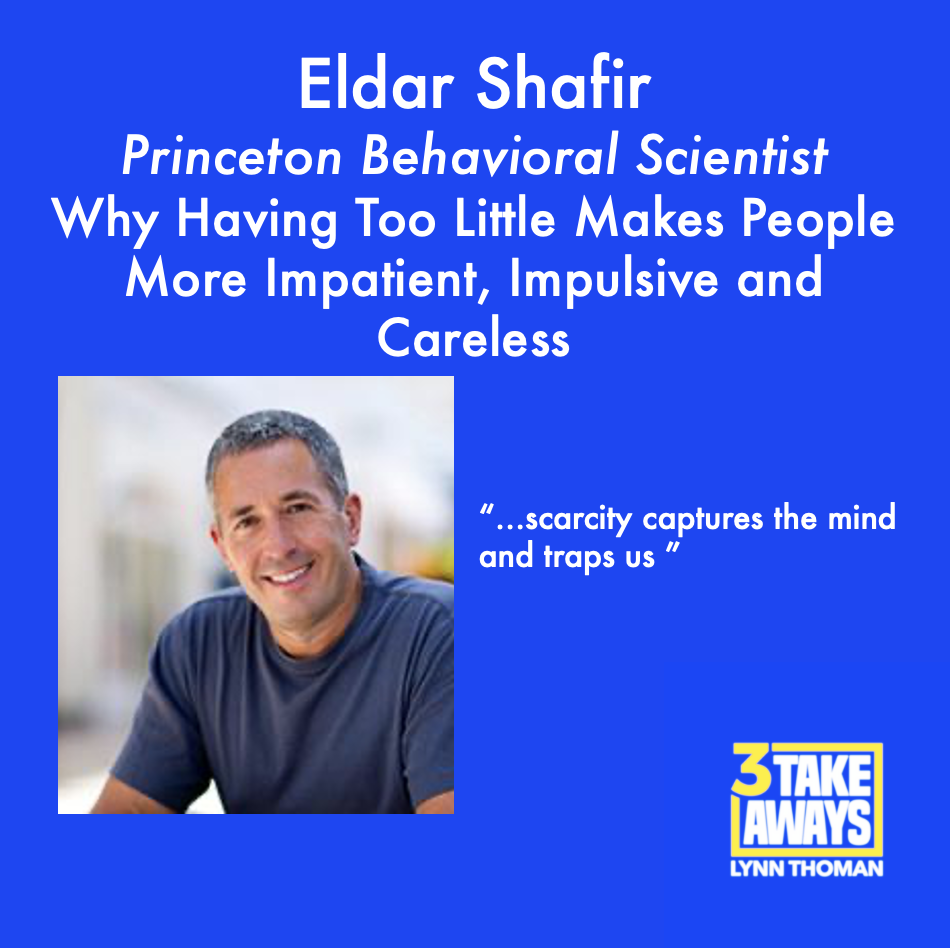
Why Having Too Little Makes People Perform Worse and Become More Impatient, Impulsive and Careless: Princeton Behavioral Scientist Eldar Shafir
Learn how scarcity of anything - money, food or social connections - affects our daily lives and leads us astray. Scarcity reduces both intelligence and control. Having too little preoccupies and taxes the mind, making life much harder. "Even smiling and being pleasant is hard when your mind is taxed. The employee snaps at rude customers ... The parent snaps at the child ... The server rings up the wrong item.”
Find out about the latest cutting edge behavioral science and how we can all manage scarcity for better satisfaction and success with Princeton behavioral scientist Eldar Shafir.
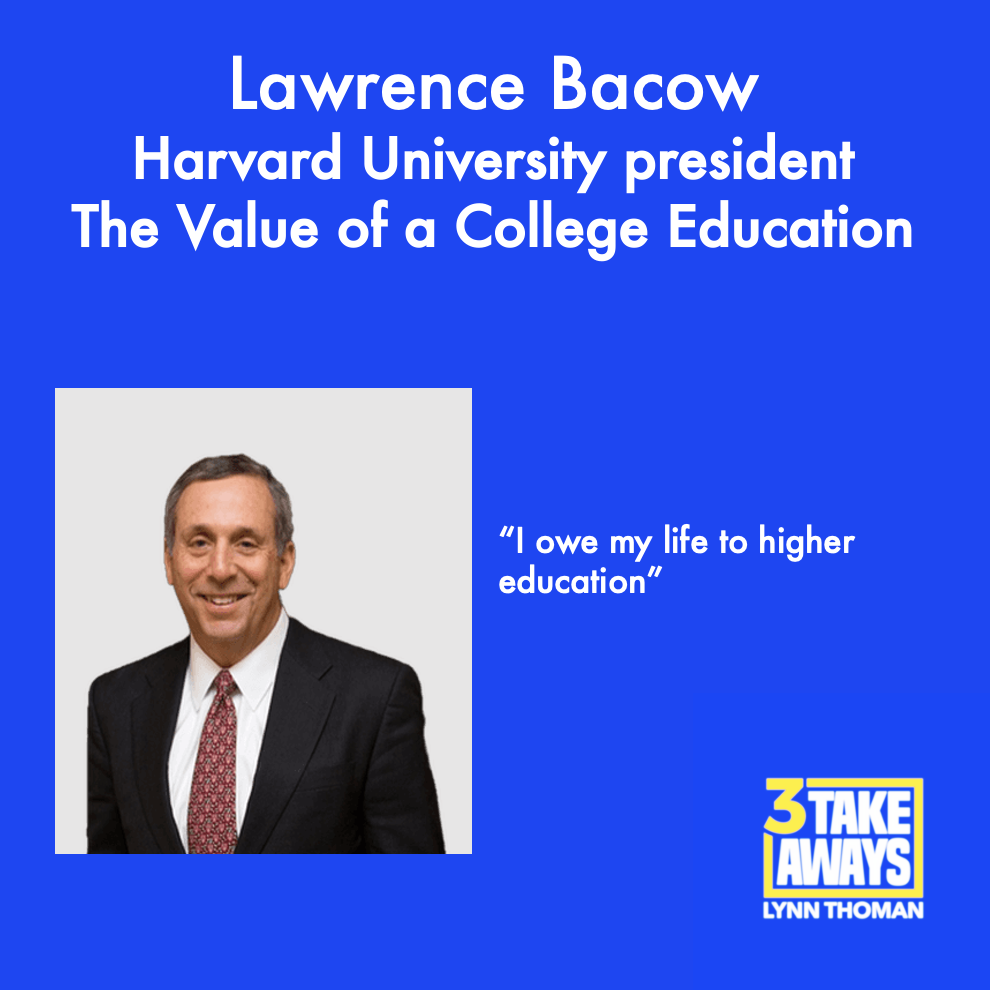
Harvard University President Lawrence Bacow: The Value of a College Education & Investing in the Future
Lawrence Bacow, President of Harvard University, shares how he sees the future of education and the values he leads by at Harvard. Learn the role of universities in a democracy, the importance of teaching students to think critically and why he believes the value of a liberal education is higher than ever.

Harvard Business School’s Bill Sahlman: What I’ve Learned Reading 10,000 Business Plans and Investing in Hundreds of Startups
Of the 10,000 business plans Bill Sahlman has read, only 3 companies met their plan. Find out what it takes to succeed. Entrepreneurs have to be really good at running tests and execution trumps idea. Jeff Bezos is the most effective experimentalist in history. Bill Gates did not invent word processing, the spreadsheet, or presentation graphics; rather he took ideas and out executed everyone else.

When Women Lead: A Groundbreaking Look at Bias, Leadership and the Future of Work with CNBC’s Julia Boorstin
The deck is still stacked against women in the workplace. Learn how some women dramatically defy the odds, and what both men and women can learn from them to succeed. Don’t miss this eye-opening conversation with CNBC Senior Correspondent Julia Boorstin.

The Exponential Age: How Accelerating Technology is Transforming Business, Politics and Society with Tech Seer Azeem Azhar
Technology is advancing at exponential speed, and humanity is having serious trouble keeping up. Azeem Azhar, a tech seer who has founded and sold four companies, shares his unique insights into what he calls the “exponential gap” and its impact on business and society.

Explore Grand Mysteries of Space, Time, Life, and the Cosmos – with World-Renowned Physicist Brian Greene
He’s been called “a successor to Einstein.” Here you’ll see why, as physicist Brian Greene offers profound insights into our place in the universe, how the world ends, the possibility of a parallel universe, and the cosmic pursuits of Jeff Bezos and Elon Musk. Don’t miss this brilliant and deeply stimulating conversation.
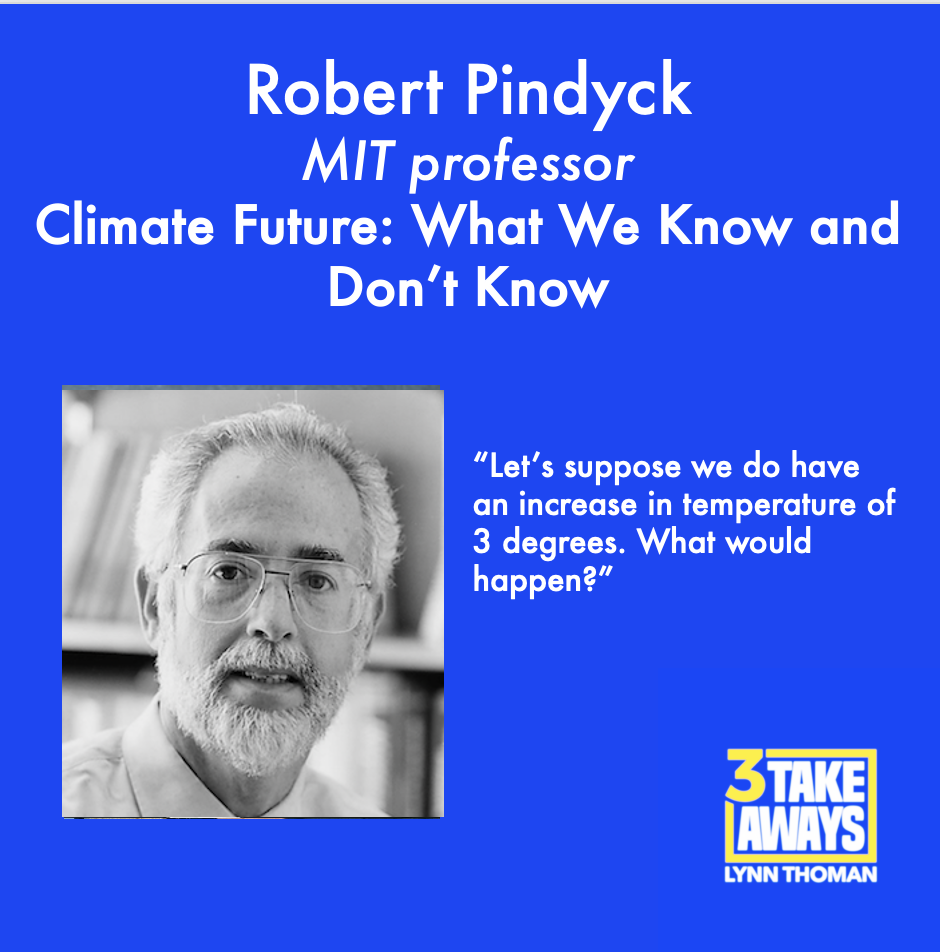
Climate Future: What We Know and Don’t Know with MIT’s Robert Pindyck
Current debates over climate change are focused almost entirely on reducing emissions - which is something we should do - but we also need to answer the question, how should we be adapting?
MIT’s Robert Pindyck shares what we know and don’t know and how we can adapt given the enormous climate uncertainty.
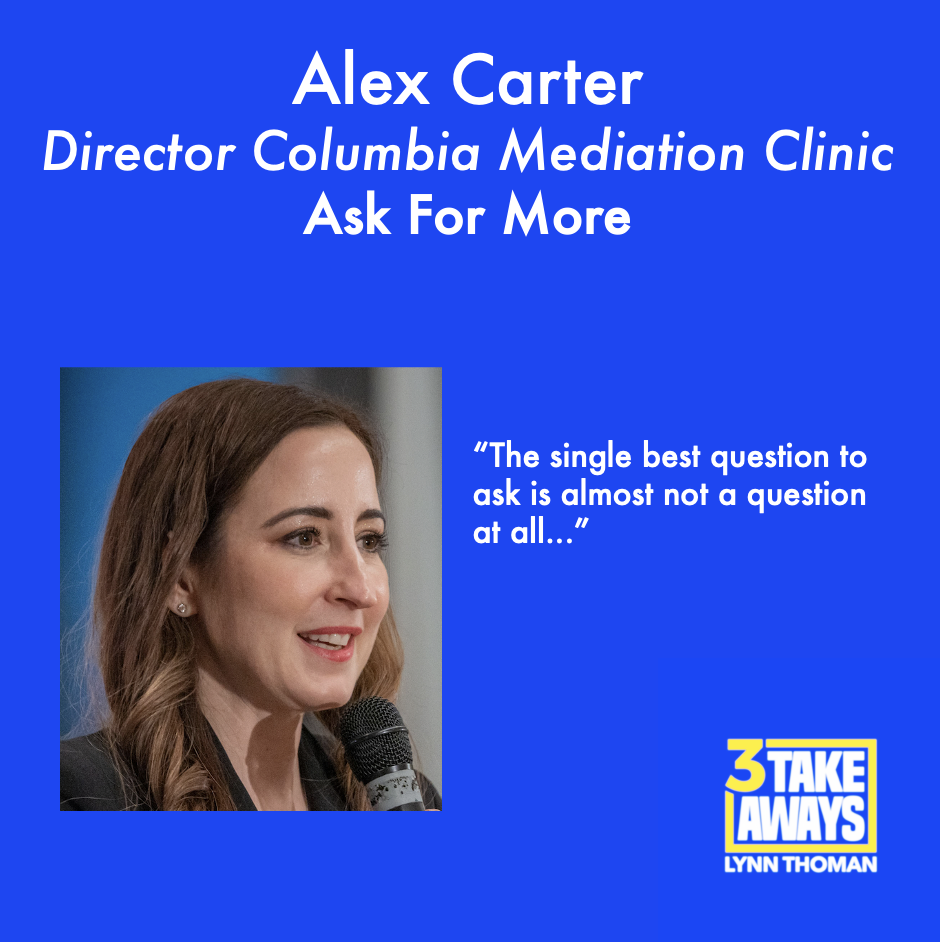
Ask For More: 2 Questions to Negotiate Almost Anything with Columbia Law School Mediation Clinic Director Alex Carter
Did you know that by asking better questions, you get better answers and better results from negotiations, as well as conversations? Learn what the 2 best questions are, and why these 2 questions work almost magically in negotiations as well as in conversations - including those with spouses, children, and colleagues.
Negotiation is not a zero-sum game. It’s an essential skill for your career that can also improve your closest relationships and your everyday life.
Alex Carter is Director of Columbia Law School’s Mediation Clinic. Her Wall Street Journal bestselling book is Ask For More.

Former FCC Chair Tom Wheeler: Our Loss of Privacy Is Worse Than You Think, No Matter What You Think
Your entire life is an open book of information collected by tech companies. According to Tom Wheeler, former head of the Federal Communications Commission, the privacy problem is shockingly large, getting bigger, and has frightening consequences. What, if anything, can be done? Listen and find out.
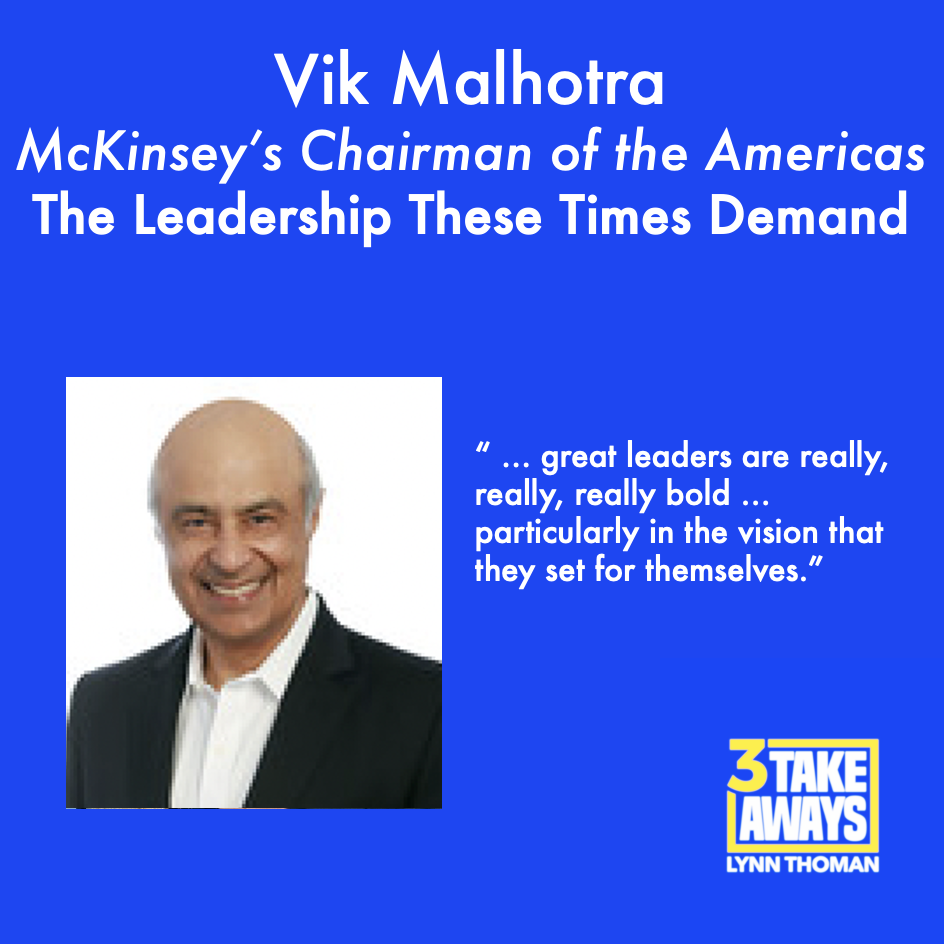
The Leadership These Times Demand – with Vik Malhotra, McKinsey’s Chairman of the Americas
Being a leader of any organization today may be more difficult than ever. What enables some leaders to thrive while others fail? What are some of the qualities and actions vital for success?
Vik Malhotra, McKinsey and Company’s Chairman of the Americas, shares his insights from interviewing and advising today’s elite business leaders. He is a co-author of the New York Times bestseller, CEO Excellence: The Six Mindsets That Distinguish the Best Leaders from the Rest.

Unconscious Bias is Real, So Are the Solutions: Harvard Kennedy School Former Academic Dean Iris Bohnet
How can we reduce or neutralize unconscious bias? It’s a critical question these days – especially with DEI in mind – answered by an expert: Iris Bohnet, the former Academic Dean of the Kennedy School and co-Director of the Women and Public Policy Program. She calls it “unfreezing” our minds, and offers some surprisingly simple solutions.
